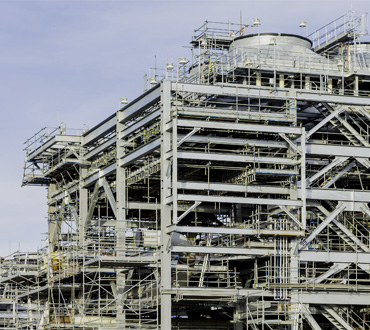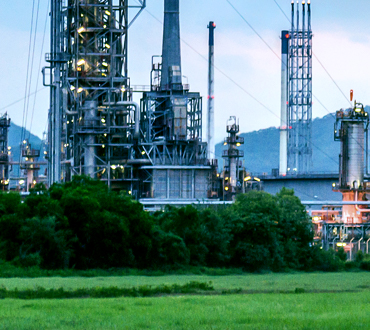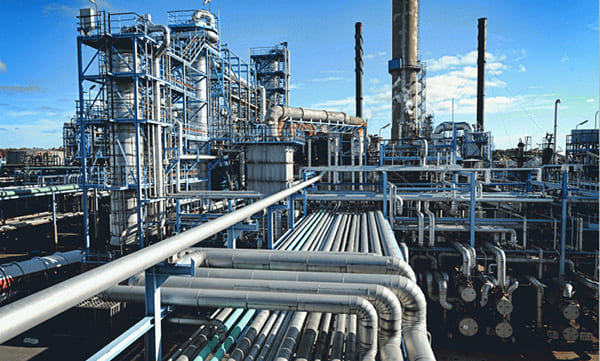Leverage insight to improve the availability, reliability, maintenance, and turnarounds of your LNG plant operations. How do you compare?
LNG plant configurations (Kit) vary dramatically depending on feedstock composition, upstream feed pressure, processing requirements and downstream product requirements. No LNG plant is the same. Therefore, look-a-like plant comparisons are insufficient and misleading. Do you know where your performance gaps exist?
Solomon’s Worldwide Liquefied Natural Gas (LNG) Processing Plant Performance Analysis (LNG Study) uses normalized comparisons to accuratley identify and quantify improvement opportunities relative to best performers and selected peer groups. Study results provide operators actionable insight that helps drive sustainable operations and improve availability, reliability, maintenance, and turnarounds.
“Insights have been very helpful and will be put to good use in our planning process. Solomon identified efficiency improvements (maintenance, personnel, other fixed costs) up to 50M USD/yr and potentially another 10–20M USD/yr in margin from energy reduction and mass balance improvement.” LNG OPERATOR
The 2020 LNG Study identified average availability improvements of 54% and average operating cost reductions of 25% as a percentage of Non-Energy Operating Cost.
- How competitive is my operation?
- Given my plant configuration, how efficient are my processing trains?
- How does my asset utilization, reliability, and maintenance costs compare to the top performers?
- What is the value of closing my performance gaps?
- How do I judge the performance of joint-venture partner operators?
The LNG Study benchmarks operations at the site, train, compressor/turbine, and process unit level with key performance indicators (KPIs) against peers. This detail enables a deeper analysis by asset type to identify the root cause of poor performance. Solomon has found that finding the right balance between KPIs delivers the best results to achieve sustainable operational performance.
Solomon's Worldwide Fuels Refinery Performance Analysis (Fuels Study) identified a group of World’s Best performers that demonstrated a consistent balance between a set of KPIs that enabled a sustainable, top-quartile profitability performance. The data showed that there is no company in the top quartile on all indicators. Solomon concluded that a careful balance of KPIs delivers the best result. This balance of characteristics creates the reference for performance comparison in the LNG Study and Solomon’s other benchmarking studies. Figure 1 shows an example of sustainable performance in terms of annualized asset availability, Non-Maintenance Personnel Efficiency Index (nmPEI®), Maintenance Cost Efficiency Index (MEI™), and Maintenance Personnel Efficiency Index (mPEI®).

Figure 1. Solomon Experience from Pacesetters
Why Participate?
- Determine competitive position relative to industry top performers.
- Utilize customized peer groups to assess specific performance comparisons.
- Formulate optimization plans to eliminate shortfalls.
- Establish performance targets and measure progress.
Study Deliverables
Study participants receive the following:
- Insight on performance versus the industry leaders and performance peer groups
- Data on companies’ and peer group’s performance site-wide, and on an individual train and compressor/driver level to identify and quantify opportunities supporting the development of improvement plans
- Performance indices and comparative rankings to peer groups
- Executive on-site results presentation
Study Focus Areas
- Availability and Utilization
- Operating Costs
- Turnaround (T/A) and Non-T/A Maintenance
- Energy and Emissions
- Personnel
- Safety
- Material Balance
Learn How You Can Participate
Join other industry peers that leverage the LNG study to achieve sustainable operational excellence and enable success. Our experienced advisors help guide clients through all the steps needed to accelerate improvement by providing proven strategies to maximize study insights, employing rigorous processes to ensure the data is accurate and consistent with methodology, conducting detailed on-site study results presentations to operations leadership and stakeholders, providing additional training upon request on the use of study data to drive improvement, and offering additional competitive gap closure assistance.
Data Quality, Benchmarking Methodology
A Foundation for Effective Comparative Performance Analysis and Decision Support
We prioritize the integrity and confidentiality of participant-submitted data and rigorously review that data before benchmarking begins. Then, we employ our normalization process and benchmarking methodology to provide valuable and trusted peer group comparisons that deliver meaningful KPIs. Finally, our staff of senior consultants apply their deep industry experience to develop practical insight and recommendations to enable your success.


.jpg)

.jpg)
.jpg)
.jpg)
.jpg)
.jpg)
.jpg)
.jpg)
.jpg)
.jpg)
.jpg)
.jpg)
.jpg)
.jpg)
.jpg)

.jpg)
.jpg)



.jpg)
.jpg)

.jpg)

